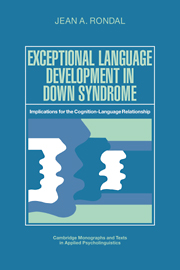 Exceptional Language Development in Down Syndrome
Exceptional Language Development in Down Syndrome Published online by Cambridge University Press: 23 December 2009
The productive and receptive language functioning of Françoise, our DS subject, was thoroughly examined and found to be normal or close to normal in its phonological and grammatical aspects. It proved more compatible with what can reasonably be expected from a moderately MR person with regard to other language subsystems, such as lexicon, semantics, and pragmatics. Françoise's awareness of aspects of her receptive and productive language (including phonological and grammatical aspects) were extremely limited. Corresponding data available from studies conducted by Curtiss, Yamada, Cromer, Bellugi, and others, were also examined. The empirical evidence clearly supports Chomsky's (1981) proposal according to which computational aspects of language, that is, phonology and syntax, are autonomous components, largely independent from general cognitive abilities, whereas conceptual aspects of language, that is, lexicon, semantics, and pragmatics, are more dependent on cognitive functioning. As established, converging evidence exists in the socalled delay-difference literature on language development in regular mentally handicapped subjects when various aspects of language development are systematically compared with respect to mental age.
The data reported and analyzed concerning language-exceptional MR individuals are strong counterindications for any theory attempting to causally relate advanced phonological and grammatical development to general cognitive variables. In particular, the theoretical suggestions coming from the work of Piaget as to the existence of specific ties between operational development and grammatical development were found wanting in many respects. Another cardinal indication to be dismissed on the basis of the present work is the idea that children, particularly MR children, develop linguistically to the extent that they have been trained and taught.
To save this book to your Kindle, first ensure [email protected] is added to your Approved Personal Document E-mail List under your Personal Document Settings on the Manage Your Content and Devices page of your Amazon account. Then enter the ‘name’ part of your Kindle email address below. Find out more about saving to your Kindle.
Note you can select to save to either the @free.kindle.com or @kindle.com variations. ‘@free.kindle.com’ emails are free but can only be saved to your device when it is connected to wi-fi. ‘@kindle.com’ emails can be delivered even when you are not connected to wi-fi, but note that service fees apply.
Find out more about the Kindle Personal Document Service.
To save content items to your account, please confirm that you agree to abide by our usage policies. If this is the first time you use this feature, you will be asked to authorise Cambridge Core to connect with your account. Find out more about saving content to Dropbox.
To save content items to your account, please confirm that you agree to abide by our usage policies. If this is the first time you use this feature, you will be asked to authorise Cambridge Core to connect with your account. Find out more about saving content to Google Drive.